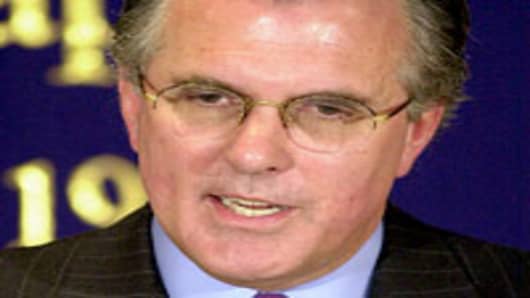Americans vote on Tuesday to elect a new president and Democrats, optimistic that their candidate Sen. Barack Obama will win back the White House from Republicans, are already pushing hard for a second economic stimulus package.
Fisher said that even with concerted and complementary action between the Fed and Congress, the U.S. economy still faced an "epic challenge'' after the collapse of its housing market sparked global market panic and chilled growth.
"The credit crisis has reached up and clutched the throat of the economy'' he told reporters after the speech.
"I expect no growth and maybe some negative numbers in the last quarter and throughout 2009. I'm talking about fourth quarter to fourth quarter,'' he said.
He had been one of the Fed's most hawkish policy-makers who had dissented against easing monetary policy at every meeting this year, but that changed in September.
Then Fisher closed ranks to vote for another interest rate cut after judging that the credit crisis had decisively trimmed the risks from rising prices.
"The impetus for rising prices came to a grinding halt as the credit crisis took grip and confidence evaporated. As the credit market congealed, inflationary momentum froze in its tracks,'' Fisher said.
However, he did not share the fear of some economists that the United States is in danger of slipping into deflation. This is a general decline in prices that mutes spending and causes bank failures to soar as loans get more expensive in real terms and go bad, as hit Japan during a 'lost decade' in the 1990s.
"I think we might see some negative numbers in a couple of months. I don't think there is a sustainable deflationary risk...There are some significant growth vectors in the global economy,'' he told reporters.
The Fed has slashed its benchmark overnight funds rate 4.25 percentage points to 1 percent since September 2007 and pumped billions of dollars into the financial system to prevent credit markets from completely freezing over.
Fisher likened this behavior to "Bagehot on steroids,'' in reference to 19th century English bank Walter Bagehot's advice that banks lend to each other during times of crisis.
It has already doubled the size of the Fed's balance sheet to around $1.9 trillion, and Fisher said this could probably keep growing to $3 trillion by the end of the year, adding: "This combination of measures, together with an effective fed funds rate of less than 1 percent, is unprecedented. We believe they are a necessary antidote to what ails the economy and a needed impetus for the restoration of confidence.''


